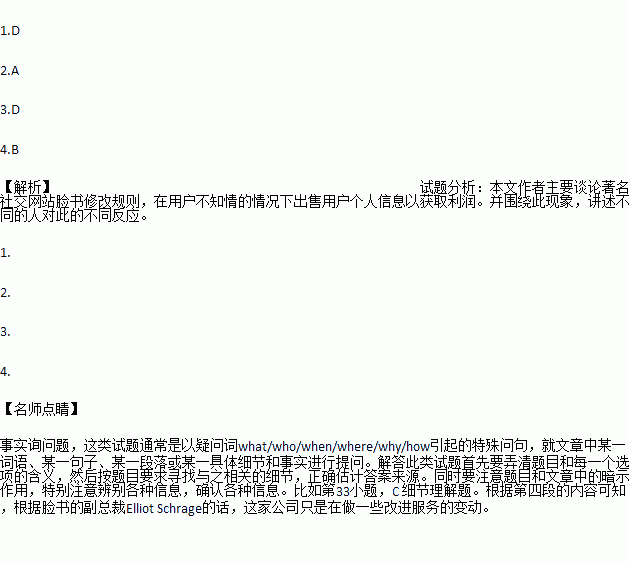题目内容
People are being lured(引诱)onto Facebook with the promise of a fun and free service without realizing they’re paying for it by giving up large amounts of personal information. Facebook then attempts to make money by selling their data to advertisers that want to send targeted messages.
Most Facebook users don’t realize this is happening. Even if they know what the company is up to, they still have no idea what they’re paying for Facebook, because people don’t really know what their personal details are worth.
The biggest problem, however, is that the company keeps changing the rules. Early on, you could keep everything private. That was the great thing about Facebook—you could create your own little private network. Last year, the company changed its privacy rules so that many things—your city, your photo, your friends’ names—were set, by default(默认), to be shared with everyone on the Internet.
According to Facebook’s vice-- president Elliot Schrage, the company is simply making changes to improve its service, and if people don’t share information, they have a “less satisfying experience.”
Some critics think this is more about Facebook looking to make more money. Its original business model, which involved selling ads and putting them at the side of the page, totally failed. Who wants to look at ads when they’re online connecting with their friends?
The privacy issue has already landed Facebook in hot water in Washington. In April, Senator(议员) Charles Schumer called on Facebook to change its privacy policy. He also urged the Commission to set guidelines for social-networking sites. “I think the senators rightly communicated that we had not been clear about what the new products were and how people could choose to use them or not to use them,” Schrage admits.
I suspect that whatever Facebook has done so far to invade our privacy, it’s only the beginning, which is why I’m considering deactivating(撤销)my account. Facebook is a handy site, but I’m upset by the idea that my information is in the hands of people I don’t know. That is too high a price to pay.
1.What do we learn about Facebook from the first paragraph?
A. It is website that sends messages to targeted users
B. it makes money by putting on advertisements
C. It provides loads of information to its users
D. It profits by selling its users’ personal data
2.Why does Facebook make changes to its according to Elliot Schrage?
A. To provide better service to its users B. To follow the Federal guidelines
C. To improve its users’ connectivity D. To expand its scope of business
3.What does Senator Charles Schumer advocate(主张)?
A. Setting guidelines for advertising on websites
B. Banning the sharing of users’ personal information
C. Removing ads from all social—networking sties
D. Formulating (制订)regulations for social—networking sties
4.Why does the author plan to cancel his Facebook account?
A. He is dissatisfied with its current service
B. He doesn’t want his personal data abused
C. He finds many of its users untrustworthy
D. He is upset by its frequent rule changes
 阅读快车系列答案
阅读快车系列答案
